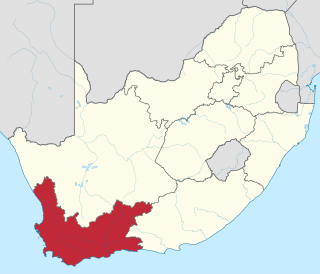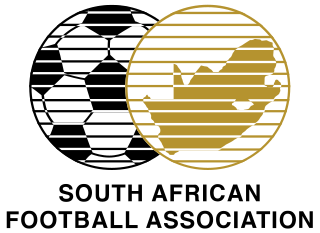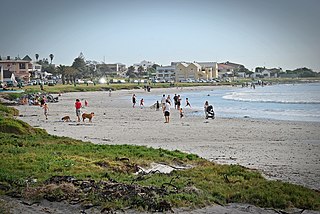Related Research Articles

Ghana, officially the Republic of Ghana, is a country in West Africa. It lies adjacent to the Gulf of Guinea and the Atlantic Ocean to the south, sharing a border with Ivory Coast in the west, Burkina Faso in the north, and Togo in the east. Ghana covers an area of 239,567 km2 (92,497 sq mi), spanning diverse biomes that range from coastal savannas to tropical rainforests. With nearly 35 million inhabitants, Ghana is the second-most populous country in West Africa. The capital and largest city is Accra; other significant cities include Kumasi, Tamale, and Sekondi-Takoradi.

South African English is the set of English language dialects native to South Africans.
Human arrival in Ivory Coast has been dated to the Upper Paleolithic period, or at the minimum, the Neolithic period based on weapon and tool fragments, specifically polished shale axes and remnants of cooking and fishing. The earliest known inhabitants of Côte d'Ivoire left traces scattered throughout the territory. Historians believe these people were all either displaced or absorbed by the ancestors of the present inhabitants. Peoples who arrived before the 16th century include the Ehotilé (Aboisso), Kotrowou (Fresco), Zéhiri, Ega, and Diès (Divo).

Ivory Coast, also known as Côte d'Ivoire and officially the Republic of Côte d'Ivoire, is a country on the southern coast of West Africa. Its capital city of Yamoussoukro is located in the centre of the country, while its largest city and economic centre is the port city of Abidjan. It borders Guinea to the northwest, Liberia to the west, Mali to the northwest, Burkina Faso to the northeast, Ghana to the east, and the Atlantic Ocean's Gulf of Guinea to the south. With 30.9 million inhabitants in 2023, Ivory Coast is the third-most populous country in West Africa. Its official language is French, and indigenous languages are also widely used, including Bété, Baoulé, Dioula, Dan, Anyin, and Cebaara Senufo. In total, there are around 78 different languages spoken in Ivory Coast. The country has a religiously diverse population, including numerous followers of Islam, Christianity, and traditional faiths like Animism.

KwaZulu-Natal is a province of South Africa that was created in 1994 when the government merged the Zulu bantustan of KwaZulu and Natal Province.

The Western Cape is a province of South Africa, situated on the south-western coast of the country. It is the fourth largest of the nine provinces with an area of 129,449 square kilometres (49,981 sq mi), and the third most populous, with an estimated 7 million inhabitants in 2020. About two-thirds of these inhabitants live in the metropolitan area of Cape Town, which is also the provincial capital. The Western Cape was created in 1994 from part of the former Cape Province. The two largest cities are Cape Town and George.

Durban is the third-most populous city in South Africa, after Johannesburg and Cape Town, and the largest city in the province of KwaZulu-Natal. Situated on the east coast of South Africa, on the Natal Bay of the Indian Ocean, Durban is South Africa's busiest port and was formerly named Port Natal. North of the harbour and city centre lies the mouth of the Umgeni River; the flat city centre rises to the hills of the Berea on the west; and to the south, running along the coast, is the Bluff. Durban is the seat of the larger eThekwini Metropolitan Municipality, which spans an area of 2,556 km2 (987 sq mi) and had a population of 4.2 million in 2022, making the metropolitan population one of Africa's largest on the Indian Ocean. Within the city limits, Durban's population was 595,061 in 2011. The city has a humid subtropical climate, with hot, wet summers and mild, dry winters.

Elmina Castle was erected by the Portuguese in 1482 as Castelo de São Jorge da Mina, also known as Castelo da Mina or simply Mina, in present-day Elmina, Ghana, formerly the Gold Coast. It was the first trading post built on the Gulf of Guinea, and the oldest European building in existence south of the Sahara.

The South African Football Association is the national administrative governing body that controls the sport of football in the Republic of South Africa (RSA) and is a member of the Confederation of African Football (CAF). SAFA established in 1991. The South African Football Association is the second Football Association in South Africa to be named the South African Football Association and it is also the second football association in South Africa to affiliate to FIFA. The present day South African Football Association, unlike its predecessor allows for a mixed-race national team.

The geography of North Africa has been reasonably well known among Europeans since classical antiquity in Greco-Roman geography. Northwest Africa was known as either Libya or Africa, while Egypt was considered part of Asia.

Melkbosstrand is a coastal town located on the South West Coast of South Africa, 30 km north of Cape Town. It forms part of the City of Cape Town Metropolitan Municipality, the municipality governing Cape Town and its greater metropolitan area.

Sodwana Bay is a bay in South Africa on the KwaZulu Natal north coast, between St. Lucia and Lake Sibhayi. It is in the Sodwana Bay National Park, and the Maputaland Marine Reserve, and is a popular recreational diving destination. The term is commonly used to refer to both the marine reserve and the terrestrial park, as well as the geographical bay.

Portuguese maritime exploration resulted in the numerous territories and maritime routes recorded by the Portuguese as a result of their intensive maritime journeys during the 15th and 16th centuries. Portuguese sailors were at the vanguard of European exploration, chronicling and mapping the coasts of Africa and Asia, then known as the East Indies, and Canada and Brazil, in what came to be known as the Age of Discovery.

The Southern Line is a commuter rail line operated by Metrorail Western Cape, connecting Cape Town station in central Cape Town, South Africa with the Southern Suburbs and the towns on the west coast of False Bay, terminating in Simon's Town.

10 Squadron was a squadron of the South African Air Force. It was formed as a fighter bomber unit on 1 April 1939 and was deployed in a coastal defence role as part of Coastal Command SAAF until 1943. It was disbanded after the threat of Japanese naval actions off the South African coast had waned. It was re-activated as a fighter squadron on 25 May 1944 and deployed to the Middle East where the squadron saw service in Syria, Libya and the Aegean and was disbanded at the end of the war in Italy.

Western Province Command was a command of the South African Army.
The Food and Canning Workers' Union (FCWU) was a trade union representing food processing workers in South Africa. Its members were mainly based in the Western and Eastern Cape. It was affiliate with the African Food and Canning Workers' Union (AFCWU).

Ray Nkonyeni Municipality is a local municipality within the Ugu District Municipality in South Africa. It is located on the south coast of KwaZulu-Natal. It was established after the August 2016 local elections by merging the Ezinqoleni and Hibiscus Coast local municipalities. As of 2022 it has a population of 362,134.
The Royal Cape Golf Club in Cape Town, South Africa was established in 1885 and is the oldest golf club in Africa.
References
See Years in South Africa for list of References